As`ad AbuKhalil says Western media never regarded the U.S. involvement for what it really was.
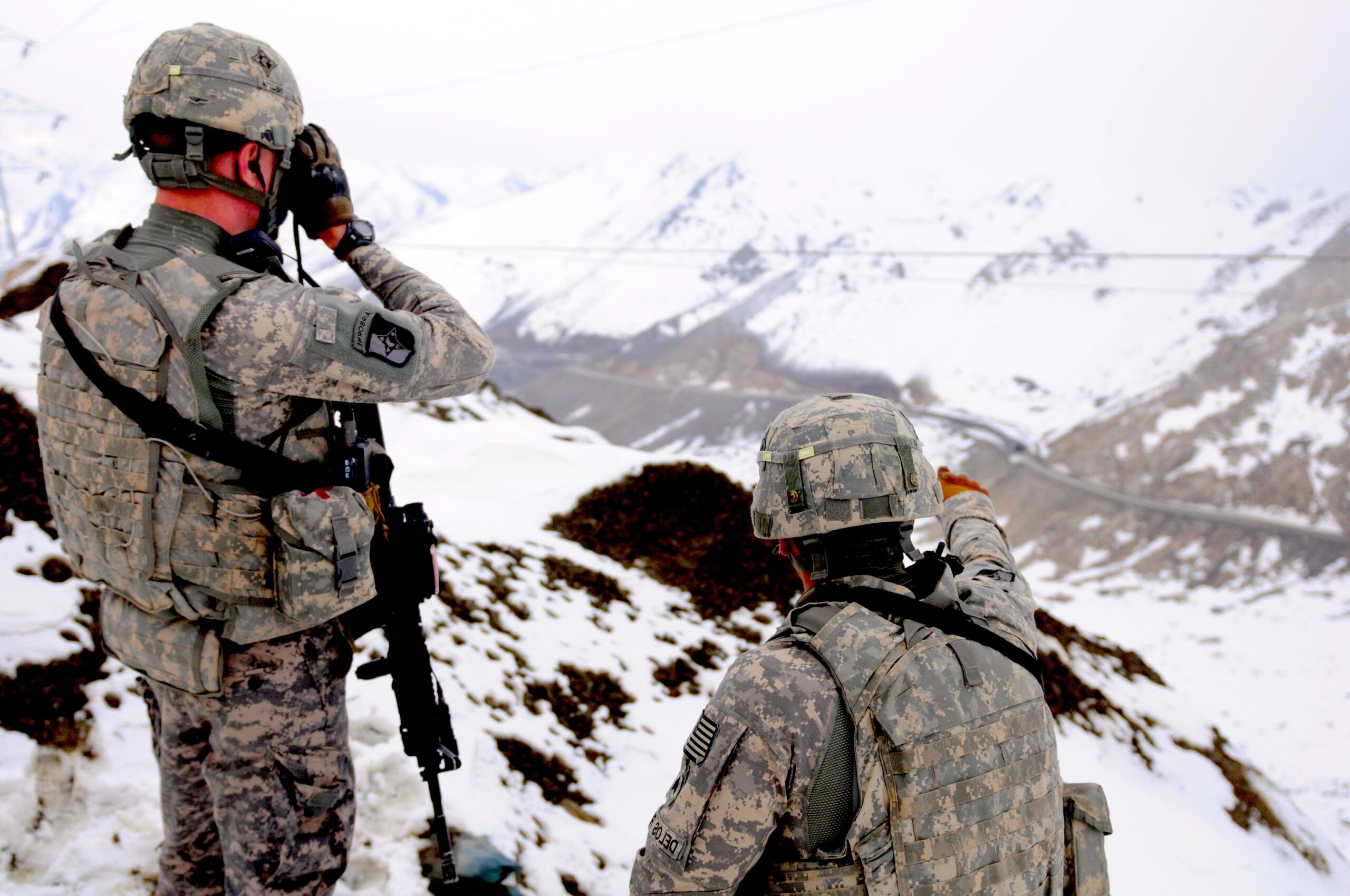
U.S. troops in 2011 conveying the Salang Pass during the war in Afghanistan, the route used by Soviet forces during the invasion 32 years before. (U.S. Armed Forces, Michael Vanpool, Wikimedia Commons)
By As`ad AbuKhalil
Special to Consortium News
 The decision by President Joe Biden to withdraw “all U.S. troops” from Afghanistan (not really all, but you know how empires fold their occupation tents) was a major decision in the contemporary history of the U.S. empire since the end of the Cold War. The U.S. war in Afghanistan has lasted longer than the Soviet military intervention in Afghanistan and yet Western media never regarded U.S. involvement for what it was: an attempt to reshape the Middle East — and beyond — according to U.S. designs. Many of the facts regarding the background of the American intervention rarely make it into U.S. media narratives.
The decision by President Joe Biden to withdraw “all U.S. troops” from Afghanistan (not really all, but you know how empires fold their occupation tents) was a major decision in the contemporary history of the U.S. empire since the end of the Cold War. The U.S. war in Afghanistan has lasted longer than the Soviet military intervention in Afghanistan and yet Western media never regarded U.S. involvement for what it was: an attempt to reshape the Middle East — and beyond — according to U.S. designs. Many of the facts regarding the background of the American intervention rarely make it into U.S. media narratives.
There is a big difference between the U.S. and Soviet experience in Afghanistan. The Soviet Union never invented exile groups and forced them on the native Afghan population to rule over them. In name only of course, as the U.S. military and the foreign service bureaucracy have really ruled the country. Just as in Iraq, the U.S. relied on puppets, with very little popular legitimacy in most cases, to rule in its name.
Ahmad Chalabi was a key favorite of the Bush administration, and the man the U.S. hoped would lead Iraq into the American orbit and even toward peace with Israel. But in the last Iraqi election before his death he had to align himself with Shiite cleric Muqtada As-Sadr in order to secure a seat for himself in the Iraqi parliament. The man who was key for U.S. intelligence and military (and who received millions of taxpayers’ money to conduct secret operations on behalf of the U.S.) wound up an ally of Iran and its allies in the region.
The Soviets, on the other hand, relied on local popular Afghans who had deep roots in their country and who had already formed popular progressive political parties. Those black-and-white photographs, which show how secular Afghanistan was, are but a testimony to the impact of secular, leftist rule there.
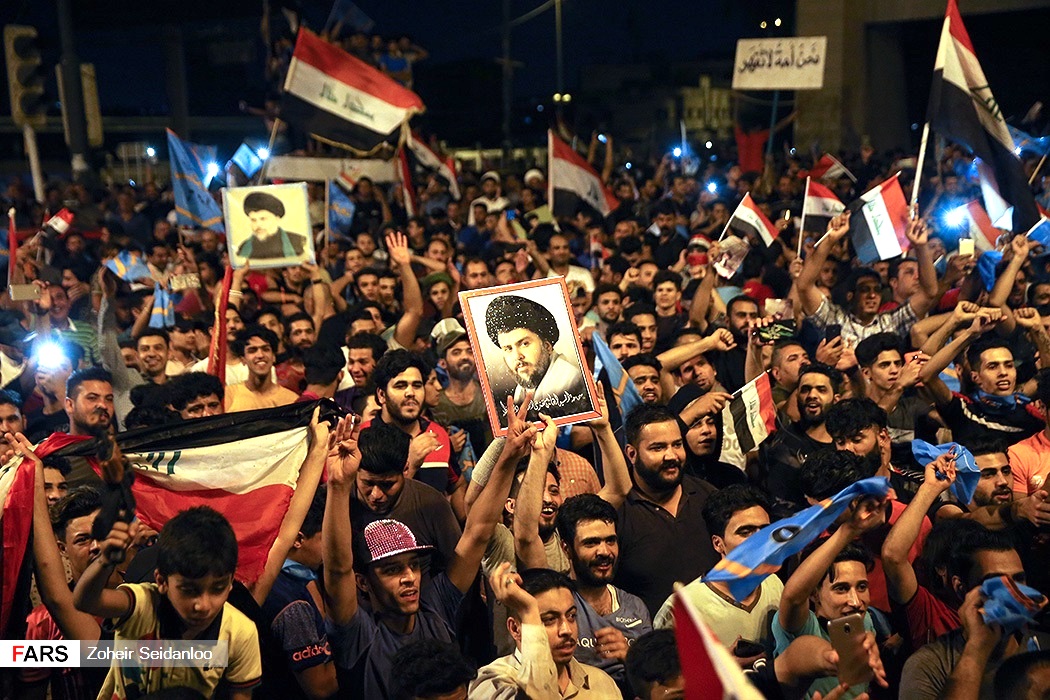
Supporters of Muqtada As-Sadr’s alliance in Liberation Square, Baghdad celebrating a successful election campaign, May 2018. (Fars News Agency, CC BY 4.0, Wikimedia Commons)
As much as the Soviet invasion of Afghanistan received coverage in U.S. media at the time (remember CBS correspondent Dan Rather donning Afghan Hollywood wardrobe and promoting the zealot mujahideen?), and as much as Western and Gulf governments complained and expressed outrage over the so-called excesses of the Soviet army, the American occupation venture in Afghanistan proved to be far more brutal and devastating — but with little media attention to U.S. human rights violations there. The number of civilians who are killed in Afghanistan by the U.S., or by its allies, often exceed the number of civilians killed per year by the Taliban.
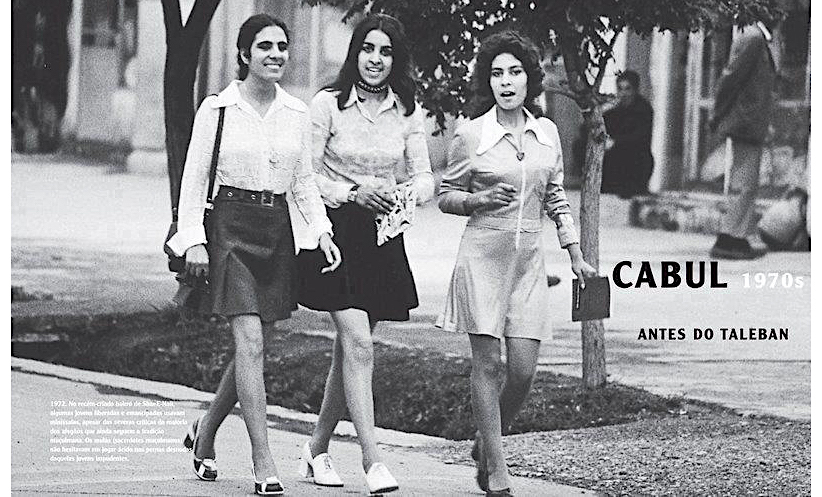
Women at university in Afghanistan in the 1970s. The US, which cries crocodile tears about the status of women in Afghanistan, backed the jihadists in the 1980s that put an end to this. (Amnesty International UK)
Prepping the People for Invasion
For every invasion, the U.S. prepares a set of propaganda talking points, and those points are dutifully carried in Western media as facts. Those talking points can be altered depending on the situation. The U.S. first invaded Iraq ostensibly to rid the country of WMDs, but when no WMDs were found the U.S. came up with another goal: of establishing democracy in the Middle East. And while the U.S. fought every attempt to democratize Iraq and tried to replace free elections with “caucuses,” it then came up with the goal of stabilizing the country (the country is yet to be stabilized).
Please Support Our Spring Fund Drive!
In Afghanistan, the U.S. invaded to punish the Taliban for the Sept. 11 attacks although there is still no evidence that the Taliban leadership knew of Osama bin Laden’s plans. When the U.S. requested that the Taliban government surrender bin Laden in the wake of Sept. 11, the Taliban government (which had the diplomatic recognition of only three countries — Saudi Arabia, Pakistan and the UAE — all key regional allies of the U.S.) seriously considered surrendering him and asked the U.S. to provide evidence of bin Laden’s guilt.
But the U.S. refused to negotiate because it was intent on invading the country to teach a lesson and to “kick some ass.” The U.S. wanted a war of revenge and 93 percent of Americans supported that war at the time (the invasion of Iraq was not as massively popular but still an overwhelming majority of Americans supported it). President George W. Bush took the occasion to assert that the U.S. wanted to overcome the Vietnam Syndrome, even though his father said in 1991 that it had been kicked once and for all. It was all a myth anyway as the U.S. never stopped intervening militarily in the affairs of countries and invading since Vietnam, but the Republican Party created that myth to rationalize their calls for more wars and more invasions.
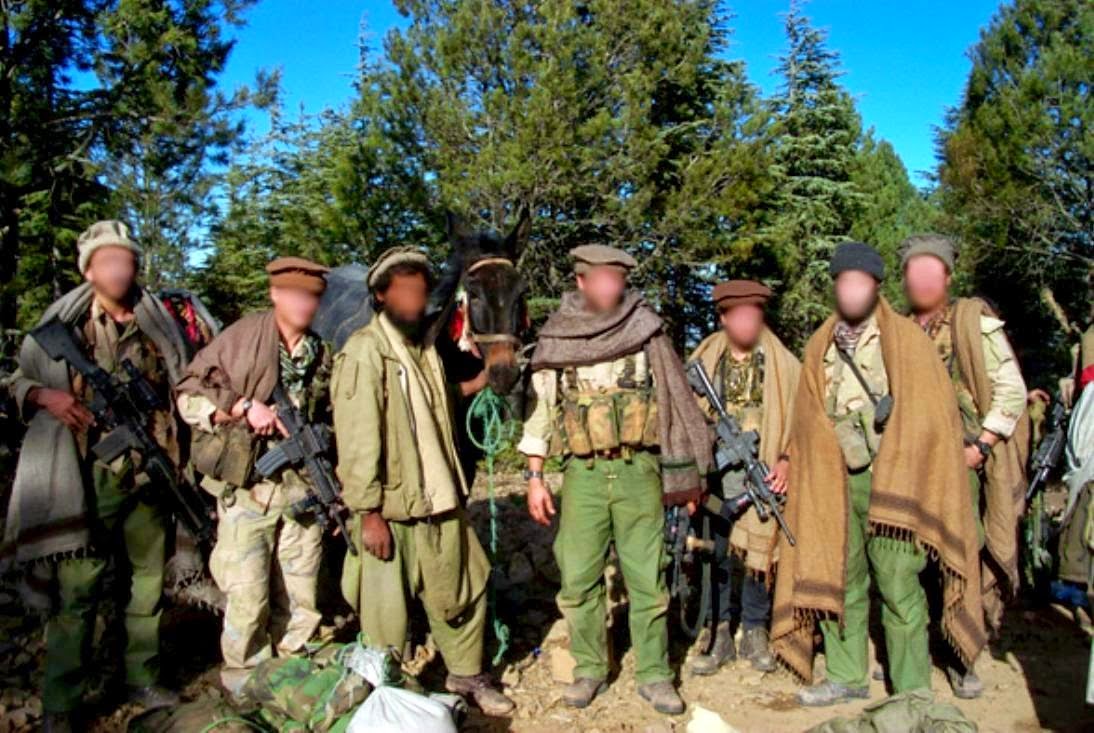
Delta Force GIs disguised as Afghan civilians, while they searched for bin Laden in November 2001. (Wikimedia Commons)
At the time of the Soviet intervention, Afghanistan was divided between reactionary, religious-oriented, obscurantist forces and leftists who wanted a progressive social agenda based on feminism, secularism and social justice. The U.S., of course, sided with the reactionary and religious zealots, which it rushed to organize, finance and arm in the wake of the Soviet military entering the country.
Bin Laden was the direct product of the U.S. involvement in Afghanistan as the U.S. was midwife for the birth of an internationalist force of religious fanatics, kooks and zealots. The Soviets faced an array of regional and international forces which the U.S. organized to undermine Moscow’s efforts in Afghanistan and a progressive Afghan regime. With help especially from Saudi Arabia, Pakistan and regional jihadists, the U.S. in the 1980s inflicted an internationalized war on the entire region from which the region would not recover, not even today.
The Soviets dealt with their war in Afghanistan rather differently. They did not organize an international force to prop up their allied regime. Furthermore, world communists failed miserably to see the historical significance of the Afghan conflict: they did not know that the defeat of the progressive project in Afghanistan would have severe repercussions on progress throughout the region — if not the world.
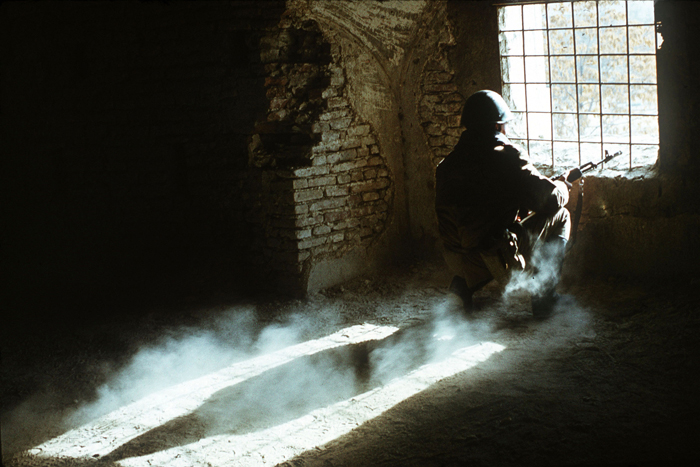
Soviet soldier in Afghanistan. (Mikhail Evstafiev via Wikimedia Commons)
They could not see the importance of defeating the reactionary project there; had they organized — just as they had done in the Spanish Civil War — they may have been able to preserve the progressive order in Kabul. It was a missed opportunity for progress worldwide. The U.S.S.R. was not, it turned out, merely defending a progressive regime in Afghanistan, but was defending progressiveness in Muslim lands worldwide.
In contrast, the U.S. and Western powers in general, were promoting reactionary forces in the Islamic world. And those forces were in sync with the reactionary regime of Saudi Arabia, which jumped at the opportunity to collaborate — yet again — with the U.S. in combating Arab and Muslim progressives.
The U.S. did not face in Afghanistan the internationalist array of forces the U.S.S.R. had faced. Washington formed an international coalition of various governments around the world — which, oddly enough, regarded the U.S. occupation of Afghanistan and a brutal campaign of pacification that the U.S. had honed in Vietnam — as a just response or revenge for Sept. 11.
Today’s Defeat
The U.S. has been defeated today in Afghanistan not by a super power with an advanced military, but by a rag-tag army of fanatical locals who perfected and consolidated their fanaticism under U.S., Saudi and Pakistani tutelage in the 1980s to fight the Soviets.
The U.S. leaves Afghanistan defeated while typically blaming a variety of forces that have nothing to do with American deeds in the country. The U.S. legacy is the disruption of village life, the rising toll of civilian casualties and the imposition of a government of thieves, embezzlers, usurpers, World Bank functionaries and a healthy dose of war criminals who were previously cobbled together in the Northern Alliance and its allies in their war against the Taliban.
Just as Iraqi expatriates (like Chalabi and Kanaan Makiyya) assured George W. Bush that native Iraqis would welcome U.S. occupation troops with open arms, a chosen select group of Afghan expatriates assured Bush that Afghans would welcome American occupation forever. But the U.S. failed to understand why locals — anywhere — would resist U.S. colonial rule.
Western media, especially The Washington Post and The New York Times, have been aghast that the Biden administration would withdraw from the country after “only” 20 years of occupation. They asked about the fate of the good Afghans — i.e., those Afghans who worked, translated, spied on behalf of the U.S. military. Various headlines bemoaned the status of women after the American departure: what would Muslim women do without U.S. troops?
But the U.S. military could not sustain the occupation forever and the hope for a stable pacification has eluded the U.S. As it withdraws its forces from Afghanistan, it is certain that the U.S., which never understood the country, is leaving it in a much worse state than when it began its intervention 40 years ago.
As`ad AbuKhalil is a Lebanese-American professor of political science at California State University, Stanislaus. He is the author of the “Historical Dictionary of Lebanon” (1998), “Bin Laden, Islam and America’s New War on Terrorism (2002), and “The Battle for Saudi Arabia” (2004). He tweets as @asadabukhalil
The views expressed are solely those of the author and may or may not reflect those of Consortium News.
Please Support Our
Spring Fund Drive!



“The U.S., of course, sided with the reactionary and religious zealots, which it rushed to organize, finance and arm in the wake of the Soviet military entering the country.”
I am afraid that it is much worse than that. The Carter administration deliberately destabilised that country in order to provoke the invasion in the first place!
This appalling act of cynicism was the brainchild of National Security Advisor Zbigniew Brzezinski. I had trouble believing it when I first read about it in William Blum’s book Rogue State. Nobody wants to believe such a terrible thing. But I did manage to track down the original Nouvel Observateur article from 1998 in which Brzezinski actually boasted of his appalling role.
Quite apart from its terrible effect on Afghanistan, this action by the Carter administration increased the kind of tensions that could have led to nuclear war.
Excellent
I’ve read that China was a part of Operation Cyclone, though Brzezinski is the only source for this that I’ve pinned down. I notice you don’t include China in your list of backers of the mujahideen, but then you also don’t mention the UK, who I’d find it hard to believe were not involved. Could you comment, especially on the role, if any, of China? Thank you.
Hey Ian – nice to see you here.
~
All the countries participate in diplomatic persuasion, but at the end of the day, it boils down to a few who are ready to take it to the end. When I say the end in this context I mean the END. And when I say the few I mean a few of us scattered around, peasants we are, who know what has been going on for so long and we have had it.
~
China and Russia and Iran and Saudi Arabia and the US of a and England and France and Italy and Spain and Turkey and everybody else would be well advised to leave Afghanistan alone so they can run their own country as they desire. Is there anybody out there who has a problem with this simple concept? I hope not. And assuming that is the case, why not apply it globally? It would save everybody a bunch of money, so come on, what about it don’t you like?
~
Peace is easy and get with the game.
BK
:
afterthought…..now you might think all that is wishful thinking of a naive fool, but if nobody thinks it will it ever happen and if it ain’t suggested is it even possible? So consider those queries if you think you are a geopolitical genius who know the future, but if you think you do, then I know you are a liar cause none of know what is going to happen next, but some of us have a plan and we will take it to the end – however the outcome is. Cause it is better to die with dignity then to die under the boot of another.
“The Chinese People’s Liberation Army provided training, arms organisation and financial support. Anti-aircraft missiles, rocket launchers and machine guns, valued at hundreds of millions, were given to the mujahideen by the Chinese. Throughout the war Chinese military advisers and army troops trained upwards of several thousand Mujahidin inside Xinjiang and along the Pakistani border.” According to Wikipedia article “Soviet-Afghan War” subsection “China”. Article also mentions Afghan Maoists fighting against government forces.
It should be mentioned that the Afghan leftists weakened their own government through fratricidal conflict and repeated coups. “In September 1979, Deputy Prime Minister Hafizullah Amin seized power, arresting and killing General Secretary Taraki. Over two months of instability overwhelmed Amin’s regime as he moved against his opponents in the PDPA and the growing rebellion…. In 1979, Taraki attended a conference of the Non-Aligned Movement in Havana, Cuba. On his way back, he stopped in Moscow on March 20 and met with Brezhnev, Soviet Foreign Minister Andrei Gromyko and other Soviet officials. It was rumoured that Karmal was present at the meeting in an attempt to reconcile Taraki’s Khalq faction and the Parcham against (Amin’s Khalq faction) and his followers…. Based on information from the KGB, Soviet leaders felt that Prime Minister Hafizullah Amin’s actions had destabilized the situation in Afghanistan. Following his initial coup against and killing of Taraki, the KGB station in Kabul warned Moscow that Amin’s leadership would lead to “harsh repressions, and as a result, the activation and consolidation of the opposition.” The Soviets established a special commission on Afghanistan, comprising KGB chairman Yuri Andropov, Boris Ponomarev from the Central Committee and Dmitriy Ustinov, the Minister of Defence. In late April 1978, the committee reported that Amin was purging his opponents, including Soviet loyalists… What was envisioned in the fall of 1979 was a short intervention under which Moscow would replace radical Khalqi Communist Amin with the moderate Parchami Communist Babrak Karmal to stabilize the situation…. On December 27, 1979, 700 Soviet troops dressed in Afghan uniforms, including KGB and GRU special forces officers from the Alpha Group and Zenith Group, occupied major governmental, military and media buildings in Kabul, including their primary target, the Tajbeg Palace…. The operation was fully complete by the morning of December 28, 1979…. Amin had been “executed by a tribunal for his crimes” by the Afghan Revolutionary Central Committee. That committee then elected as head of government former Deputy Prime Minister Babrak Karmal, who had been demoted to the relatively insignificant post of ambassador to Czechoslovakia following the Khalq takeover, and announced that it had requested Soviet military assistance.Amin had been “executed by a tribunal for his crimes” by the Afghan Revolutionary Central Committee. That committee then elected as head of government former Deputy Prime Minister Babrak Karmal, who had been demoted to the relatively insignificant post of ambassador to Czechoslovakia following the Khalq takeover, and announced that it had requested Soviet military assistance….” from Soviet–Afghan War (Wikipedia) “Under Mikhail Gorbachev, the Soviet Union deposed (Babrak) Karmal in 1986 and replaced him with Mohammad Najibullah.” from Babrak Karmal (Wikipedia)
Not a history studier but I knew about Afghanistan’s ability to eliminate invaders. I find it hard to believe that only 7% opposed the invasion. I’m definitely in that group because I remember arguing about it in a chat room. So I’ll take my bow but, I suspect that 7% was early war propaganda.
I visited Afghanistan twice in the mid 1980s. This superb analysis is the kind of unvarnished report denied to Americans in almost all of our mass media. The photo of the young women is no p.r. gimmick. What he says about the government that the U.S. decided to destroy at all costs– even if that meant pretty much creating, arming and funding the Taliban and a host of other bandits, thieves, fanatics and drug profiteers — is spot on. Their “crime” was that they intended to use their country’s resources to benefit their own people instead of the oil and mineral monopolies and arms industry. Want more info? Google Dr. Anahita Retabzad and learn about the kind of Afghan the U.S. government was determined to destroy.
The article captures an essential part of American foreign policy, its now firmly established hatred of the USSR and now Russia. Never mind that the Zbig brainstorm destroyed any hope of a stable and reasonably advanced Afghan society, that defeating Russia was paramount and the terrible effects on Afghanistan that exist to this day of little import.
Asa’ ad AbuKhalil spelled it out: “But the U.S. military could not sustain the occupation forever and the hope for a stable pacification has eluded the U.S. As it withdraws its forces from Afghanistan, it is certain that the U.S., which never understood the country, is leaving it in a much worse state than when it began its intervention 40 years ago.”
In another of our regime change wars, we lost. Again.
Spot on.
What I continue to find hilarious (and not in a good way) is that good ol’ Zbig, the Russophobe’s Russophobe, wanted to screw the Russians and give them their own Vietnam. Complete is his failure. What Zbig didn’t understand is that Afghans, Iraqis, etc etc don’t want to be Americans, they want to be themselves. Only America’s vassal states (which includes Poland which is Zbig’s home country) want to be Americans. So all of our “interventions” (another name for aggressive war) were bound to fail in the long run.
Even though Zbigniew Brzezinski was born in Poland, his family was from Galicia, the viciously anti-Russian core of western Ukraine.
I’ll bet for him, striking a blow against the Soviets was worth almost any cost.
“Complete is his failure.”
Sadly, not complete enough. He did succeed, so soon after the wars on Cambodia, Laos and Vietnam, in starting another US-backed saga of death and destruction, in which the major losers were again the poor in a poor nation – a saga which continues to this day, and which the US has stated it intends to remain a part of after its troop withdrawals this September. One can only hope there’s a further parallel with Vietnam, in that Afghanistan rises renewed as an independent nation, the graveyard of empires succeeding against the empire of graveyards.
Well said